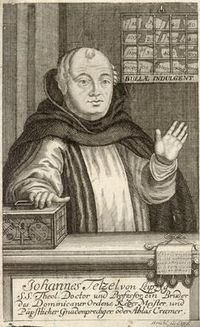- Johann Tetzel
-
Johann Tetzel (1465 in Pirna – 11 August 1519) was a Dominican preacher accused of selling indulgences and known for a couplet attributed to him:
- "As soon as a coin in the coffer rings / the soul from purgatory springs."[1]
Original German: "Wenn die Münze im Kästlein klingt, die Seele in den Himmel springt".
This oft-quoted saying was by no means representative of the official Catholic teaching on indulgences, but rather, more a reflection of Tetzel’s capacity to exaggerate. Yet if Tetzel overstated the matter in regard to indulgences for the dead, his teaching on indulgences for the living was pure. German Catholic historian of the Papacy, Ludwig von Pastor explains[2]:
Above all, a most clear distinction must be made between indulgences for the living and those for the dead.
As regards indulgences for the living, Tetzel always taught pure doctrine. The assertion that he put forward indulgences as being not only a remission of the temporal punishment of sin, but as a remission of its guilt, is as unfounded as is that other accusation against him, that he sold the forgiveness of sin for money, without even any mention of contrition and confession, or that, for payment, he absolved from sins which might be committed in the future. His teaching was, in fact, very definite, and quite in harmony with the theology of the Church, as it was then and as it is now, i.e., that indulgences "apply only to the temporal punishment due to sins which have been already repented of and confessed"....
The case was very different with indulgences for the dead. As regards these there is no doubt that Tetzel did, according to what he considered his authoritative instructions, proclaim as Christian doctrine that nothing but an offering of money was required to gain the indulgence for the dead, without there being any question of contrition or confession. He also taught, in accordance with the opinion then held, that an indulgence could be applied to any given soul with unfailing effect. Starting from this assumption, there is no doubt that his doctrine was virtually that of the drastic proverb:- “As soon as money in the coffer rings, the soul from purgatory's fire springs."
In 1517, it was believed that Tetzel was trying to raise money for the ongoing reconstruction of St. Peter's Basilica, though the money went towards helping the Archbishop of Mainz, Albert of Brandenburg, under whose authority Tetzel was operating, to pay off the debts he had incurred in securing the agreement of the Pope to his acquisition of the Archbishopric. Martin Luther was inspired to write his Ninety-Five Theses, in part, due to Tetzel's actions during this period of time.[3]
Tetzel was born in Pirna, Saxony, and studied theology and philosophy at the university of his native city.[dubious ] He entered the Dominican order in 1489, achieved some success as a preacher, and was in 1502 commissioned by the pope to preach the jubilee indulgence, which he did throughout his life. In 1509 he was made an inquisitor of Poland, and in 1517 Pope Leo X made him commissioner of indulgences for all Germany.
He acquired the degree of Licentiate of Sacred Theology in the University of Frankfurt an der Oder, 1517, and that of Doctor of Sacred Theology, 1518, by defending, in two disputations, the doctrine of indulgences against Luther. The accusation that he sold full forgiveness for sins not yet committed, caused great scandal; Martin Luther considered his actions evil, and began to preach openly against him.
He was also condemned (though later pardoned) for immorality. It became necessary to disavow Tetzel and, when he discovered that Karl von Miltitz had accused him of perpetrating numerous frauds and embezzlements, he withdrew, broken in spirit, wrecked in health, into the Dominican monastery in Leipzig. Miltitz was later discredited to the point where his claims carry no historical weight. Tetzel died in Leipzig in 1519. At the time of his death, Tetzel had fallen into disrepute and was shunned by the public. On his deathbed, Tetzel received a magnanimously penned correspondence from Martin Luther, stating that the child (i.e. the scandal) had a different father.[4]
References
- ^ Thesis 55 of Tetzel's One Hundred and Six Theses. These "Anti-theses" were a reply to Luther’s Ninety-Five Theses and were drawn up by Tetzel’s friend and former Professor, Konrad Wimpina. Theses 55 & 56 (responding to Luther's 27th Theses) read: "For a soul to fly out, is for it to obtain the vision of God, which can be hindered by no interruption, therefore he errs who says that the soul cannot fly out before the coin can jingle in the bottom of the chest." In, The reformation in Germany, Henry Clay Vedder, 1914, Macmillon Company, p. 405. [1] Animam purgatam evolare, est eam visione dei potiri, quod nulla potest intercapedine impediri. Quisquis ergo dicit, non citius posse animam volare, quam in fundo cistae denarius possit tinnire, errat. In: D. Martini Lutheri, Opera Latina: Varii Argumenti, 1865, Henricus Schmidt, ed., Heyder and Zimmer, Frankfurt am Main & Erlangen, vol. 1, p. 300. (Reprinted: Nabu Press, 2010, ISBN 1142405516 ISBN 9781142405519). [2] See also: CATHOLIC ENCYCLOPEDIA: Johann Tetzel
- ^ Ludwig von Pastor, The History of the Popes, from the Close of the Middle Ages, Ralph Francis Kerr, ed., 1908, B. Herder, St. Louis, Volume 7, pp. 347–348. [3]
- ^ "Johann Tetzel" Encyclopedia Britannica, 1911 Edition. Retrieved Jan. 26, 2007
- ^ Ganss, Henry. "Johann Tetzel." The Catholic Encyclopedia. Vol. 14. New York: Robert Appleton Company
External links
- CATHOLIC ENCYCLOPEDIA: Johann Tetzel
- "Johann Tetzel" Encyclopedia Britannica, 1911 Edition.
- Ludwig von Pastor, The History of the Popes, from the Close of the Middle Ages, Ralph Francis Kerr, ed., 1908, B. Herder, St. Louis, Volume 7, pp. 347–348.
Categories:- 1465 births
- 1519 deaths
- Members of the Dominican Order
Wikimedia Foundation. 2010.

